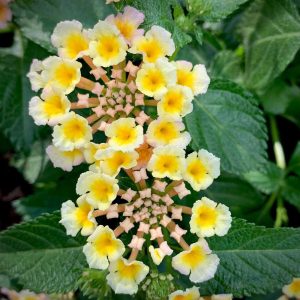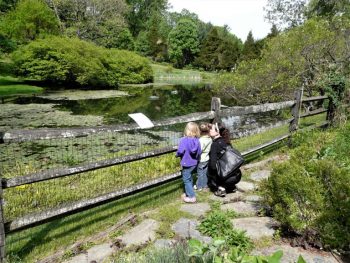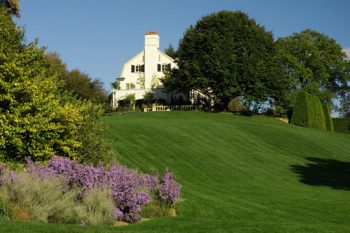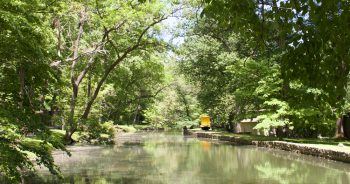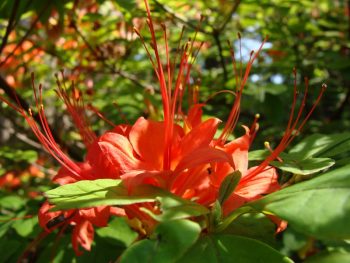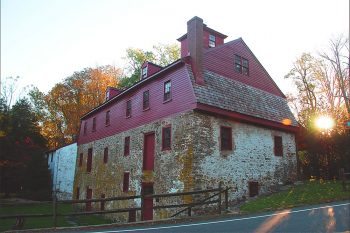By Denny Dyroff, Entertainment Editor, The Times
With the easing up of COVID-19 restrictions in Pennsylvania, Delaware, Maryland and New Jersey, more attractions are re-opening. For people who have been suffering from cabin fever, this is a good thing because it means there are more options for things to do.
The weather even seems to be co-operating.
After several weeks of temperatures in the mid-90s and heat index readings in triple figures, the weather forecast for the next week is calling for daily highs in the low 80s.
Now is the perfect time to get out and enjoy nature at sites that are dedicated to preserving and presenting the bounty of nature – for several reasons.
The weather is inevitably going to get nasty again – real soon. August in the Delaware Valley always brings ultra-high temperatures and brutal humidity. July was a preview so get out while it’s not real muggy and the heat is moderate.
The time is also right because venues are still open.
It seems as if it’s just a matter of time until everything will be shut down again because of a spike in COVID-19 infections – not “if” but “when.”
And, communing with nature is always a great way to spend a day.
Longwood Gardens (Route 1, Kennett Square, https://longwoodgardens.org/), which is one of the area’s premier attractions is open to the public again.
Longwood’s website posted this message –
Our Space … Your Place
Summer is here. And at Longwood, there’s room to roam. To relax. To play. To explore. There’s room for fantastic fountains and for family fun. Room to stroll under towering trees and room to savor the season’s beauty. Room to wander. Room to wonder. Room for you.
Just as our Gardens are a place of pleasure and respite, they are also a place of wellness and safety. Please honor the new visiting guidelines we’ve created in accordance with state and local regulations. It takes all of us to make our Gardens a world apart.
We will continue to make updates to our visiting guidelines. We appreciate your ongoing understanding.
When visiting, please remember to:
—Wear a mask
—Make room for one another
—Practice good hygiene
—Mind the green dots
—Follow one-way paths.
Another Longwood website page posted this:
We kept our promise to you. We’re welcoming you back to a place of beauty, a place of resilience, a place that has been so lovingly sustained … for all of our yesterdays, our todays, and our tomorrows.
Our beloved plants and trees have been waiting patiently to show off their beauty, give you a place of respite, and demonstrate the power of resilience. Upon reopening, our visiting experience will be different. We are committed to maintaining our culture of safety and well-being for all. Therefore, we have instituted new visiting guidelines in accordance with state and local regulations to help provide a safer and enjoyable experience while enjoying the beauty of our Gardens.
These new regulations touch many aspects of visiting our Gardens, including operating days and hours, Member reservations and ticket availability, personal protective equipment when visiting, arrival practices, mobility rentals, available restrooms, open garden spaces and pathways, and more. Conditions in our Gardens will continue to evolve, as will visiting guidelines, and we look forward to offering additional experiences as soon as we are able.
For example, some of our iconic outdoor garden spaces will require mindful walking in order to maintain safety and social distancing while you enjoy them … but they’re still here and still thriving. Our indoor spaces, including our Conservatory and Peirce-du Pont House will not be available upon our reopening … but they’ll be ready and waiting for when we can once again open their doors.
Upon reopening, we will be keeping our fountains running continuously throughout the day. The fountains will be dancing to the sounds of water and nature, not to music nor to dedicated shows, so you may soak in the splendor at any time while still maintaining social distancing.
While conditions will evolve and guidelines will change, many constants remain. Our appreciation for you. Our gratitude for one another. Our joy in sharing our beauty with you. And our commitment to many, many more beautiful tomorrows. Welcome back to Longwood.
A nice thing about Longwood Gardens is that there are plenty of things to do inside such as its impressive conservatory and indoor gardens as well as outside.
One of the featured outdoor attractions is the fountain performances — 12-minute performances daily at 11:15 a.m.; 1:15, 3:15 and 5:15 p.m. plus a 12-minute performance Fridays and Saturdays at 7:15 p.m., and 5-minute performances at 6:15 and 8:15 p.m.
The Open Air Theatre Fountain Shows featuring 750 jets in changing patterns are presented several times every day. The five-minute shows run daily at 10:15 a.m., and 12:15, 2:15 and 4:15 p.m.
The Illuminated Fountain Performances are 30-minute spectacles in which water in all shapes, sizes, and heights combines with music and infinite colors. The shows are presented Fridays and Saturdays at 9:15 p.m. each night.
Video link for Illuminated Fountain Performances — https://youtu.be/AHsC2YuFerY.
Admission to Longwood Gardens is — Adults, $25; seniors (ages 62 and older) and college students (with valid ID), $22; youth (ages 5-18), $13; children (4 and under), free.
Jenkins Arboretum (631 Berwyn Baptist Road, Devon, www.jenkinsarboretum.org) is open Monday-Friday from 9 a.m.-6 p.m.
Guests are asked to limit their visits to one hour to allow time for others to visit without crowding. You must wear a mask and practice social distancing at all times during your visit.
The mission of Jenkins Arboretum & Gardens is to preserve natural tranquil woodlands for community enjoyment, to showcase native plants and a world class collection of rhododendrons and azaleas, and to promote environmental horticulture through learning, research and conservation.
Jenkins Arboretum & Gardens is one of the region’s great horticultural and environmental assets.
As a botanical garden, the Arboretum maintains a collection of trees, shrubs, wildflowers, and ferns in a tranquil, naturalistic landscape. In addition, the Arboretum features an accredited, world-class collection of rhododendrons and azaleas from across the globe. The Arboretum is comprised of 48 acres of gardens and woodland, with 1.2 miles of trails.
The Arboretum celebrated its 40th Anniversary in 2016 with the launch of the “Forever Jenkins: Endow an Acre” campaign. This endowment campaign will ensure that the Arboretum will remain free, open, and growing for generations to come.
Chanticleer (786 Church Road, Wayne, www.chanticleergarden.org) once again is open to all.
Chanticleer has been called the most romantic, imaginative, and exciting public garden in America. The garden is a study of textures and forms, where foliage trumps flowers, the gardeners lead the design, and even the drinking fountains are sculptural. It is a garden of pleasure and learning, relaxing yet filled with ideas to take home.
The garden has evolved greatly since the death of the owner in 1990. As the home of the Rosengartens, Chanticleer was beautiful and green with impressive trees and lawns. Most of the floral and garden development you see today has occurred since 1990, designed by Chanticleer staff and consultants.
There are seven Horticulturists, each responsible for the design, planting, and maintenance of an area. The areas are continually evolving, each with its own feel, yet joined together as one complete unit. The Teacup Garden and Chanticleer Terraces feature seasonal plants and bold-textured tropical and subtropical plants. These areas change greatly from year to year. Non-hardy plants overwinter in greenhouses and basements.
Garden capacity will be limited in order to manage safe distancing. All guests arriving by personal vehicle must make a parking reservation for the day and time of their visit.
Chanticleer’s website posted this message –
- Parking reservationsare required for all visitors, including 2020 Season Pass holders, and must be reserved online in advance.
• Painting in the garden is not permitted at this time.
• Rest rooms are open.
• Some paths in the garden are marked as one way for your safety.
• Plant lists (paper copies) are unavailable at this time.
• Bring your own water. Two water bottle filling stations are available, one in the Kitchen Courtyard near the Entrance and one on the Elevated Walkway. Drinking fountains have been turned off. Please prepare for hot weather; it’s better to carry too much water than not enough.
• Seating and furniture should be used with caution as we are unable to sanitize them between each use.
• The historic Chanticleer House is closed.
• Do not visit if you do not feel well or have symptoms of COVID-19.
• Be safe. Practice social distancing. Avoid gathering in groups and keep your hands clean.
• Please bring a mask or face covering and wear it in the rest rooms, or when you are near other people.
Admission to Chanticleer is: Adults (13 years and over) – $10.00; Pre-teen children (12 years and under) – Free.
Winterthur (5105 Kennett Pike, Winterthur, Delaware, http://www.winterthur.org/) has opened its gates to the public and reservations are required.
Outdoor areas and the first-floor galleries are open. The Winterthur Store is open. Some in-person programs are available including guided garden walks and garden tram tours.
Almost 60 years ago, collector and horticulturist Henry Francis du Pont (1880–1969) opened his childhood home, Winterthur, to the public. Today, Winterthur (pronounced “winter-tour”) is the premier museum of American decorative arts, with an unparalleled collection of nearly 90,000 objects made or used in America between about 1640 and 1860. The collection is displayed in the magnificent 175-room house, much as it was when the du Pont family lived here, as well as in permanent and changing exhibition galleries.
Winterthur is set amidst a 1,000-acre preserve of rolling meadows and woodlands. Designed by du Pont, its 60-acre naturalistic garden is among America’s best, with magnificent specimen plantings and massed displays of color. Graduate programs and a preeminent research library make Winterthur an important center for the study of American art and culture.
Because the well-being of our valued visitors and our staff remains our highest priority, safety measures such as the online reservation system, reduced capacity, and the restriction of some indoor areas remain in effect.
When you visit, please bring a face mask. In outdoor areas, you must wear a face mask when it is difficult to maintain a safe social distance of six feet from people who are not from your household. Wearing of face masks is required in all indoor areas at all times, on trams tours, and on guided walks.
Masks must securely cover your nose and mouth. If you have a medical condition that prevents you from wearing a face mask, we ask that you do not visit at this time.
Other state-mandated restrictions will be necessary through all phases of reopening. Please help Winterthur comply. Maintain appropriate physical distancing, follow one-directional pathways, and take other precautions as posted on-site.
Enchanted Woods is open, but several of the features are closed to play. The second-floor galleries and museum will remain closed for now.
Timed tickets will be available for two-hour intervals, beginning at 8 a.m. and ending at 4 p.m. daily. Tickets are $20 for adults, $6 for children (2-11), and $18 for seniors (62) and students (with valid ID).
Hagley Museum & Library (200 Hagley Creek Road, Wilmington, Delaware, www.hagley.org) has opened the lower property with miles of trails and stunning scenery along the Brandywine.
Located on 235 acres along the banks of the Brandywine, Hagley is the site of the gunpowder works founded by E.I. du Pont in 1802. This example of early American industry features indoor and outdoor exhibitions, including restored mills, a workers community, and the ancestral home and garden of the du Pont family.
Visitors should plan to spend two-to-three hours at the site if they wish to do a guided tour, see the demonstrations and exhibitions, and explore the grounds.
One of the site’s highlights is Eleutherian Mills.
High on a bank of the Brandywine River overlooking the original powder mills, E. I. du Pont, founder of the DuPont Company, built his home. For almost a century, the Georgian-style home and surrounding complex of buildings and gardens served as the center of family and business life. Five generations of du Pont family members lived in the house since its completion in 1803, each leaving their mark.
Today you will see it much as it was when the last family member lived there, filled with furnishings and collections of American folk art, alongside treasured family pieces and items brought with the family from France when they left in 1799.
The residence complex, accessible by one of Hagley’s tour buses, is a large, walkable area that includes the barn, the du Pont family home, the “First Office” of the Company, Lammot du Pont’s Workshop, and the E. I. du Pont Garden. Guided tours of the home and first office are given throughout the day. The remainder of the complex is yours to explore at your own pace.
The First Office of the DuPont Company was constructed in 1837 and remained the nerve center for the company for more than fifty years. An early typewriter, ledgers, and telegraph key reflect the business activities that were once housed in this building.
Admission to Hagley is $7 for adults and $5 for children (6 and older).
Mt. Cuba Center (3120 Barley Mill Rd, Hockessin, DE, mtcubacenter.org) is a botanical garden unlike any other.
The origins of Mt. Cuba Center took root more than 80 years ago. What was once farmland has been transformed into a lush botanical garden featuring some of the region’s most beautiful native plants.
Mt. Cuba’s statement is — Our mission is to inspire an appreciation for the beauty and value of native plants and a commitment to support the habitats that sustain them.
In 2018, Mt. Cuba Center and Red Clay Reservation merged — combining conservation efforts in northern Delaware with a total of 1,083 acres.
Admission to Mt. Cuba is $15 for adults, $8 for children (ages 6-17) and free for children (6 and under).
Tyler Arboretum (515 Painter Road, Media, https://tylerarboretum.org/) was open for a while on a limited basis for Tyler members only. Now, the scenic garden attraction is open to the public.
With 650 protected acres of beautiful woodland, seasonally charming meadows, and a lively program of seasonal events and activities, Tyler Arboretum is a delight for nature lovers, birders, botanists, and those who want rediscover the natural world.
Tyler Arboretum offers seasonally changing gardens, stands of towering trees (several of which are state champions), 17 miles of hiking trails, and a selection of historic buildings dating back to the 18th century.
Dating to 1681, making it one of the oldest public gardens in the United States, and home to eight generations of three families, Tyler Arboretum connects visitors to the region’s rich culture and history while preserving, developing, sharing, and celebrating Pennsylvania’s priceless horticultural heritage.
General admission at Tyler Arboretum is: Adults (ages 18-64): $15; Seniors (65+): $13; Children and young adults (ages 3-17): $9; Military and students with valid ID: $9. Children age 2 and under are admitted free.
Newlin Grist Mill ( 219 South Cheyney Road, Glen Mills, www.newlingristmill.org) is a 1704 grist mill and 160-acre park dedicated to historical preservation and environmental appreciation.
The NGM Visitor Center, Archive, Blacksmith Shop, Millwright Shop, and public restrooms remain closed. All tours, programs and events have been postponed or cancelled during this period and pond fishing will remain closed until further notice.
The trails will remain open, but parking is limited. Everyone should be mindful of social distancing when on the property.
All dogs must be on a leash that is held securely by the owner at all times. This is a township law, and it is to protect the health and safety of all park visitors (human and canine) and the wildlife in the park.
The park contains unique habitats that are home to sensitive plants and animals, some of which are being monitored through ongoing scientific surveys. Visitors are instructed to stay on the trails to avoid disturbances (wading, dip netting, collecting, rock throwing etc.) that could damage wildlife and vegetation. Collecting of any kind, including plants and animals, is prohibited in the park.
Andalusia Historic House, Gardens and Arboretum (1237 State Rd, Andalusia, https://andalusiapa.org/) reopened its 100-acre space for socially distant, self-guided tours.
Located on a wooded promontory overlooking the Delaware River, Andalusia has been a stately presence on this stretch of water, just north of Philadelphia, for more than two hundred years. The ancestral home of the Biddle family, Andalusia is also a natural paradise of native woodlands and spectacular gardens that have evolved over time.
Placed on the National Register of Historic Landmarks in 1966, the Big House — one of the finest examples of Greek Revival architecture in the United States — provides an unparalleled look into our nation’s past, while also offering a glimpse into the life of a family that helped to shape its future.
Admission to Andalusia is $15 per person. There is no charge for children under 12.
The grounds of Awbury Arboretum (The Francis Cope House, One Awbury Road, Philadelphia, awbury.org) remain open daily from sunrise to sunset, and, as always, are free.
Tucked away in the historic Germantown neighborhood of Northwest Philadelphia, Awbury Arboretum is a vibrant landscape with a rich history. Once the private enclave of an extended Quaker family, Awbury Arboretum has been open to the public free of charge as a public park and arboretum for nearly 100 years. Its 55-acre historic landscape now stands as a green oasis in a densely populated urban environment.
Awbury was originally the summer home of the Cope family. Henry Cope, a Quaker shipping merchant, purchased Awbury in 1852 and named the estate after the village, Avebury, England, from which his family originally emigrated. Awbury soon became a year-round home for members of the extended Cope family. Various Victorian and Colonial Revival houses were built between 1860 and the 1920’s, forming a unique cultural landscape.
Concern for the preservation of this piece of open space led to the establishment of the Arboretum in 1916 by members of the Cope family, for use as an Arboretum for the “quiet enjoyment of nature” and for educational purposes. In 1985, the Awbury Arboretum Association was established as a not-for-profit corporation entrusted with promoting the well-being of the Arboretum for the benefit of the community.
The Arboretum’s grounds include open meadows, ponds, woods, and lawns. Thousands of trees, many of them more than a century old, give visitors a chance to become acquainted with over 200 species, including a champion size River Birch (Betula nigra). Wildlife includes a variety of birds, squirrels, chipmunks, frogs, opossums, and rabbits.
Morris Arboretum (100 East Northwestern Avenue, Philadelphia, www.morrisarboretum.org) is a 92-acre Victorian arboretum in Northwest Philly. It has resumed welcoming visitors back to enjoy its scenic gardens.
Guests can enjoy thousands of rare and lovely wooded plants, including many of Philadelphia’s oldest, rarest and most magnificent trees. To prevent overcrowding, advance tickets are required.
Morris Arboretum of the University of Pennsylvania began in 1887 as Compton, the summer home of John and Lydia Morris, brother and sister. The I.P. Morris Company, an iron-manufacturing firm founded by their father and later run by John Morris, was a source of family wealth.
The land the Morrises purchased in Chestnut Hill was barren, with poor soil that drained too quickly; but with diligent care they surrounded their home with a landscape and plant collection devoted to beauty and knowledge. Two Lines a sculpture by George Rickey marks the former mansion site. The Widener Visitor Center was formerly the carriage house.
Plants that are in bloom right now are Clematis “Etoile Violette” (Etoile Violette clematis), Rhododendron austrinum, (Florida azalea), Aquilegia canadensis (American columbine), Rosa ‘Souvenir de la Malmaison’ (Souvenir de la Malmaison), Allium giganteum (giant allium), Asimina triloba (common pawpaw), and Kalmia latifolia (mountain laurel).
Morris Arboretum is now open seven days a week. Tickets are $20 for adults, $18 for seniors (65-plus), $10 for youth (3-17) and free for children (3 and under).
Not far from Morris Arboretum is Wissahickon Valley Park (various entry points including 120 W. Northwestern Avenue, https://fow.org/).
This lush, 1,800-acre gem in near Roxborough, offers 57 miles of trails, crossing forest and meadow. Visitors can walk, bike or ride a horse through on the trails, or venture up the steeply wooded paths for a more challenging hike or off-road cycling adventure.
The Shofuso Japanese Cultural Center (Lansdowne and Horticultural drives, Philadelphia, https://japanphilly.org/shofuso/) recently reopened for 2020 and was one of the first gardens to open in Philadelphia.
Designed by architect Junzo Yoshimura, Shofuso was built in Japan in 1953 using traditional techniques and materials. It was shipped to New York and exhibited in the courtyard of the Museum of Modern Art in New York before moving to West Fairmount Park in 1958.
In 2007, international artist Hiroshi Senju, inspired by the garden’s waterfall, donated 20 contemporary murals to Shofuso, which are permanently displayed inside the house. This historic site and museum feature a hill and pond garden with a tiered waterfall, island, and koi fish, a tea garden featuring a traditional tea house, and a courtyard garden leading to a bathhouse.
Shofuso is open from 10 a.m.-4 p.m. from Wednesday through Friday and 11 a.m.-5 p.m. on Saturday and Sunday. Following guidance from the CDC and the City of Philadelphia, it has adopted the following policies:
All visitors age three and over must wear a mask. There will be hand sanitizing stations throughout the grounds. At the entrance, six-foot markers will allow people to wait in line safely.
Tickets are first come, first served; Adults: $12; senior 65+, $8; children 5 – 17, $8.
Natural Lands (1031 Palmers Mill Road, Media, natlands.org) has its nature preserves open to the public as places for outdoor recreation.
Natural Lands’ locations in this area are: Binky Lee Preserve (1445 Pikeland Road, Chester Springs), ChesLen Preserve (1199 Cannery Road, Coatesville), Stroud Preserve (454 North Creek Road, West Chester), Sadsbury Woods Preserve (443 Old Wilmington Road, Coatesville), Willisbrook Preserve (Line Road, Malvern), Crow’s Nest Preserve (201 Piersol Road, Elverson), Bryn Coed Preserve (1869 Flint Road, Chester Springs), Stoneleigh: A Natural Garden (1829 East County Line Road, Villanova), Saunders Woods Preserve (1020 Waverly Road, Gladwyne), Hildacy Preserve ( 1031 Palmers Mill Road, Media), and Wawa Preserve (Valley Road, Media).
The Lancaster County Conservancy protects more than 2,900 acres of land for the health of the ecosystem and the enjoyment of the public. The closest to Chester County is the Octoraro Creek Nature Preserve (https://www.lancasterconservancy.org/preserves/octoraro-creek/).
The Octoraro Creek Nature Preserve primarily serves as the tree and shrub lined buffer for the Octoraro Creek. From the water there is very little disturbance of the creek’s wild and scenic nature. Wildlife abounds with regular sightings of otter, kingfisher, bald eagles and osprey.
Eel and shad still migrate up the Octoraro Creek from the Atlantic Ocean because there are no dams on the lower section of the creek. Octoraro Creek empties directly into the Susquehanna River in Maryland.
The Conservancy acquired this land in 2008 with funding from the PA Department of Conservation and Natural Resources, the Natural Lands Preservation Fund of Lancaster County, and the 1675 Foundation.
Other Lancaster County Conservancy locations are Tucquan Glen Nature Preserve (https://www.lancasterconservancy.org/preserves/tucquan-glen-pyfer/), Ferncliff Wildflower and Wildlife Preserve (https://www.lancasterconservancy.org/preserves/ferncliff-wildlife-and-wildflower/), Fishing Creek Nature Preserve (https://www.lancasterconservancy.org/preserves/fishing-creek-south/), Trout Run Nature Preserve (https://www.lancasterconservancy.org/preserves/trout-run/), Homewood Nature Preserve (https://www.lancasterconservancy.org/preserves/homewood/), Rannels-Kettle Run Nature Preserve (https://www.lancasterconservancy.org/preserves/rannels-kettle-run/), Steinman Run Nature Preserve (https://www.lancasterconservancy.org/preserves/steinman-run/) and Turkey Hill Trail (https://www.lancasterconservancy.org/preserves/turkey-hill/).

